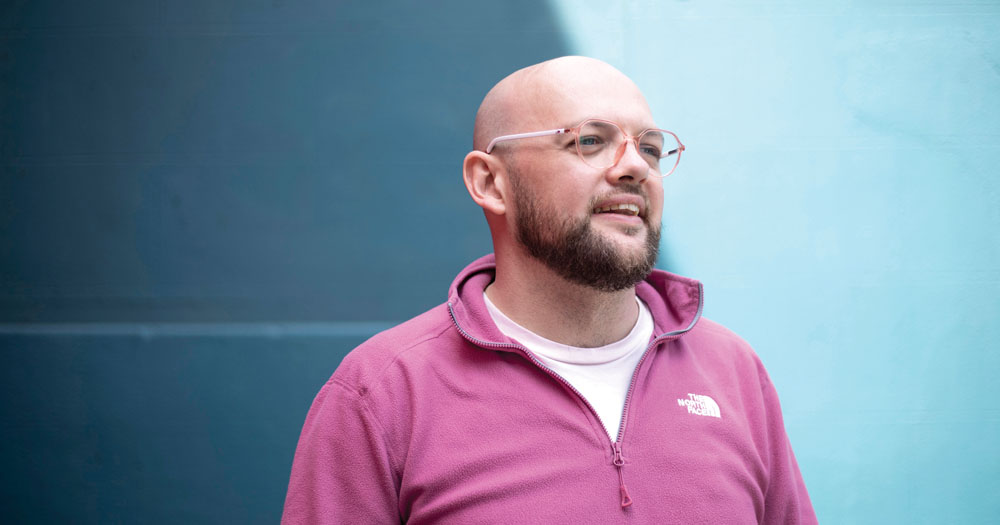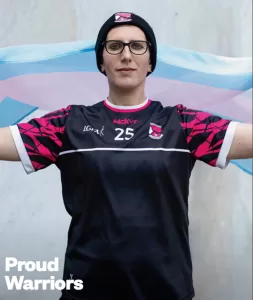As we celebrate Pride Month across this island, we must confront the harsh reality that our community faces a rising tide of disinformation, scapegoating and hate. It’s time again for us to channel our collective pain and anger into action for social justice. As part of the #StrongerTogether initiative in collaboration with the Rowan Trust and the Hope and Courage collective, GCN interviewed Yusuf Murray, Communications Officer with the organisation Uplift, who spoke about the importance of online activism amid the rise of the far-right.
Born in rural Ireland and going on to live across three continents, it’s easy to understand why Yusuf Murray has a unique understanding of the world. Coming from a part-Muslim and part-Irish Catholic household, Yusuf’s queer life has also taken its own long and difficult journey.
Yusuf took a tiered approach to coming out – “First to friends, to safe people, in safe spaces to eventually just saying ‘Screw it!’ and coming out totally a couple of years ago.”
While he has a strong emotional attachment to Ireland as his place of birth, there is a bittersweet relationship with its queer scene; “As someone who doesn’t drink, largely for religious reasons, sometimes I wonder ‘Where can I go?’” Although there are a handful of queer spaces to visit that are not alcohol-oriented, he wishes there were more.
Yusuf’s Muslim identity has taught him a lot about being thick-skinned. “Growing up as a Muslim in a post-9/11 world wasn’t easy,” he admits. That intense negativity towards Muslim individuals in the media in previous years has helped him empathise with the trans community due to the current media tirade they are being subjected to.
Having grown up with headlines that criticised his orientation and weaponised ‘problematic’ minority groups within his religious identity in the hopes to spur on hysteria and moral panic, Yusuf says it feels “all too similar” to what’s currently happening to trans people.
Yusuf Murray works for Uplift, an independent people-powered organisation who are consistently campaigning for change throughout Ireland. He explains the importance of his role in communications; “We know the far right put so much time and money into their messaging with simple and powerful slogans like ‘Make America Great Again’. As progressive people ourselves, sometimes I worry we get ourselves caught up too much in our own discourse when that doesn’t concern the wider public.
“I work on the final hurdle of public communications in my organisation. I think it’s so important because we’re living in a dangerous time where the far right is able to co-opt people in ways that don’t even make sense.
“The story that we tell – that a better world is possible, and that people can live in harmony – is a powerful tool… Love is better than hatred. It’s so easy to believe it can’t be done, which is where the search for those negative scapegoats starts. That intervention is where our work at Uplift comes in.”
Yusuf also believes that legislative change can come from the power of the individual. “The simple act of signing a petition takes 30 seconds. Then suddenly it will grow in numbers to 5,000 people then 10,000 people. It catches the eye of policymakers and politicians. It’s a great example of what Uplift can do.”
Uplift has managed many successful protests and in-person events in recent times. Though these are essential and important, an interaction the organisation had with an individual when Uplift was just starting to take off still resonates strongly. “We were contacted by a disabled woman from Co Clare. She said ‘I watch the news and read the papers every day and I want to do something, but I can’t get to protests, it’s too difficult for me with my disability. But now I can be involved, I can sign the petitions I can be part of the conversations.’”
That alone shows the importance of the digital side of Uplift – how the organisation can help liberate everyone and that every voice can make a change to combat the far-right movement. When asked what advice he would give his younger self, Yusuf shares, “I would say that it’s fine to have different parts of your identity, that you don’t have to reconcile them. Sometimes those parts can be contradictory, or maybe they just don’t fit together easily in people’s minds.
“Like how I am Muslim and gay. You can just exist. You can have different pieces of yourself and when you start to embrace all of them, you start to come together as a whole instead of being different people in different rooms. Just embrace the differences within yourself.”
This story originally appeared in GCN’s Pride issue 378, as part of an ongoing feature on solidarity that was created in cooperation with the Rowan Trust and the Hope and Courage Collective. You can read this interview with Yusuf Murray and other activists in the full issue here.
Want to be featured in this special campaign? Share a message of solidarity using #StrongerTogether, tagging GCN or email [email protected].
© 2023 GCN (Gay Community News). All rights reserved.
This article was published in the print edition Issue No. 378 (June 1, 2023). Click here to read it now.
Support GCN
GCN is a free, vital resource for Ireland’s LGBTQ+ community since 1988.
GCN is a trading name of National LGBT Federation CLG, a registered charity - Charity Number: 20034580.
GCN relies on the generous support of the community and allies to sustain the crucial work that we do. Producing GCN is costly, and, in an industry which has been hugely impacted by rising costs, we need your support to help sustain and grow this vital resource.
Supporting GCN for as little as €1.99 per month will help us continue our work as Ireland’s free, independent LGBTQ+ media.

